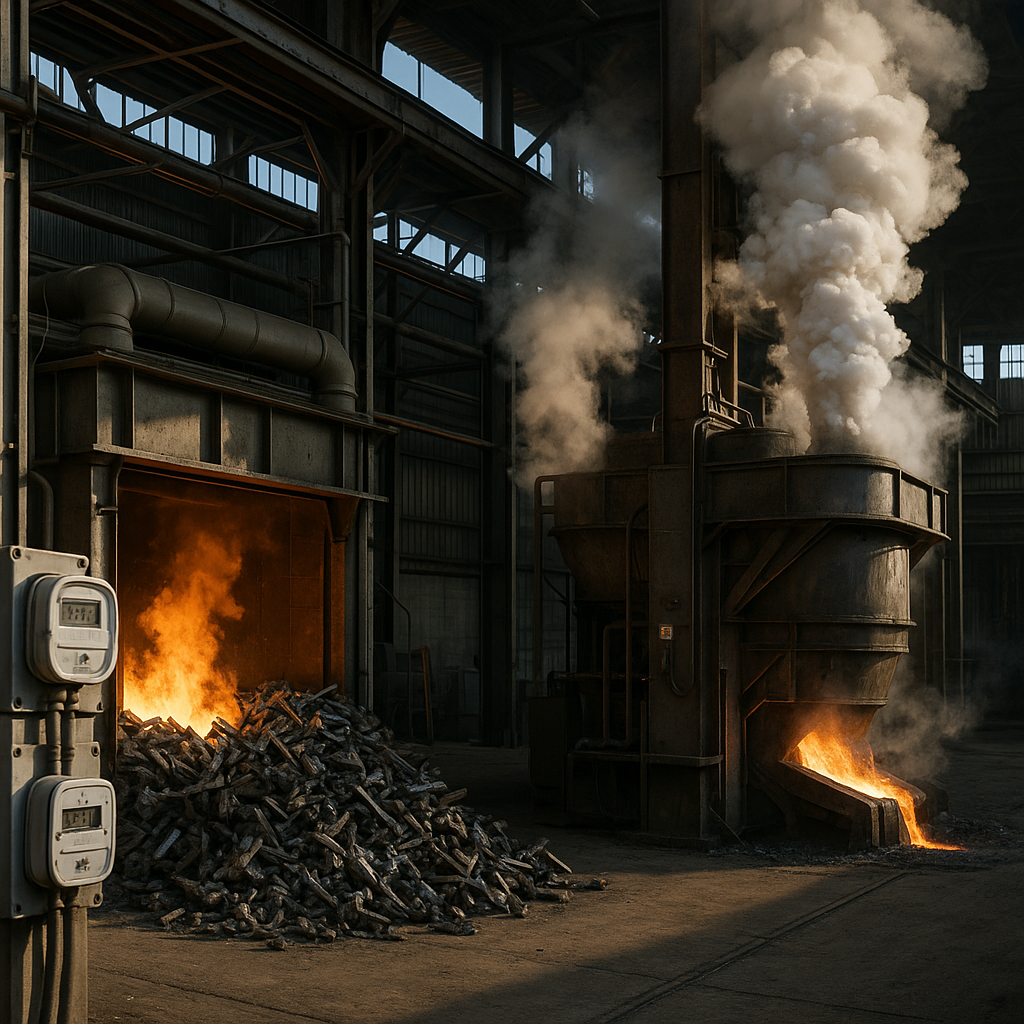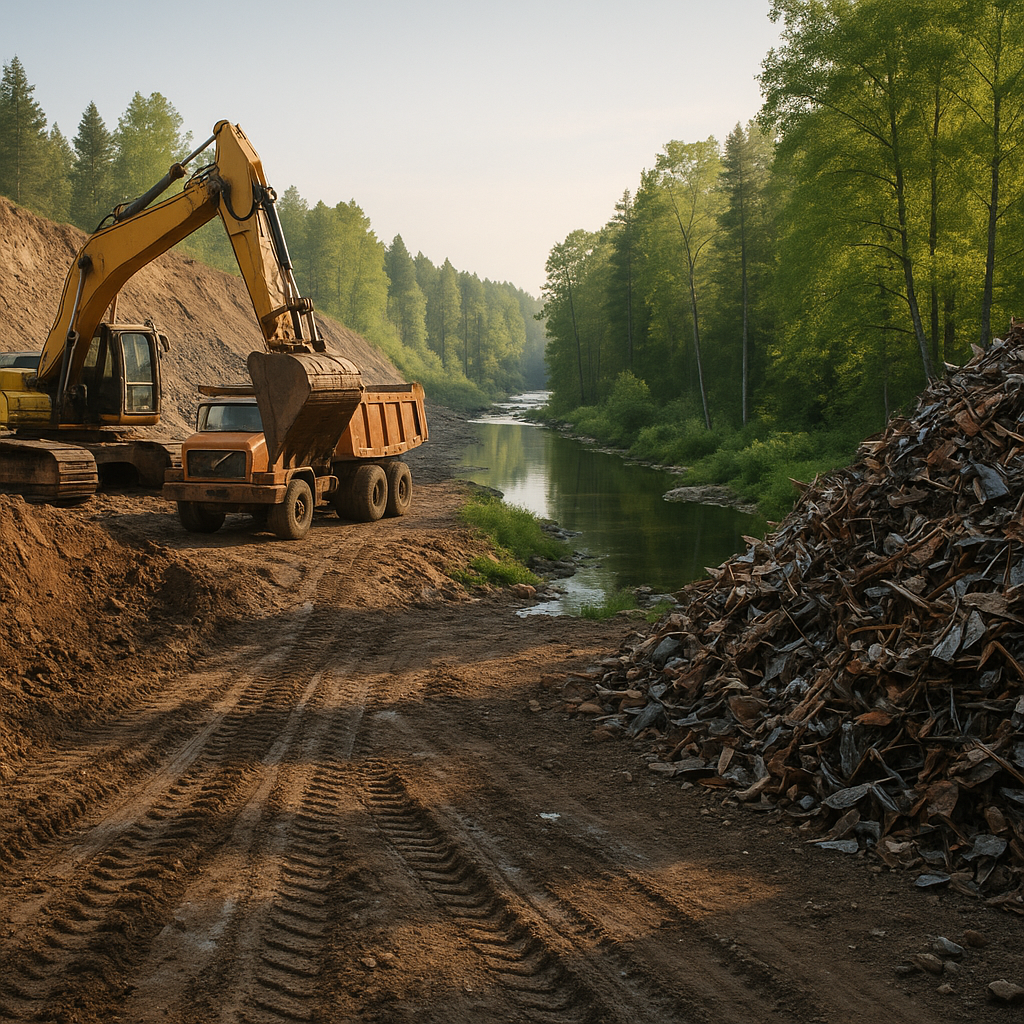5901 Botham Jean Blvd, Dallas, TX 75215
Environmental Impact of Metal Recycling: Everything You Need to Know
October 18, 2025Metal recycling converts discarded metal products into valuable resources for creating new items. This process diverts metal waste from landfills and offers an alternative to mining virgin ore, significantly impacting multiple ecological systems.
Recycling metals like aluminum, copper, and steel conserves finite natural resources that would otherwise be extracted through mining. Traditional mining operations cause deforestation, soil erosion, and habitat destruction, while also contaminating waterways with harmful chemicals and generating significant air pollution.
The figures highlight the environmental benefits of metal recycling. Recycling aluminum saves 95% of the energy needed for production from raw bauxite ore. Steel recycling reduces energy consumption by 60% compared to virgin production. Copper recycling saves 85% of the energy required for primary extraction while reducing CO2 emissions by 65%.
How Does Metal Recycling Reduce Energy Usage and Emissions?

Metal recycling is a powerful tool for conserving energy and reducing emissions. Recycling metals requires significantly less energy than extracting and processing them from ore, resulting in numerous environmental benefits.
The energy savings from recycling aluminum compared to primary production are significant. Recycling aluminum uses up to 95% less energy than producing new aluminum from bauxite ore, leading to notable impacts. For example, the energy saved from recycling a single aluminum can could power a computer for three hours.
Steel recycling also offers considerable energy savings. It uses about 60-75% less energy than making steel from iron ore. Each ton of recycled steel saves 2,800 pounds of iron ore, 1,600 pounds of coal, and 600 pounds of limestone—resources that otherwise require extraction.
Copper recycling similarly saves about 85% of the energy needed for primary production. This trend is consistent across various metals, with recycling consistently needing less energy than virgin material processing.
Direct Impact on Greenhouse Gas Emissions
These energy savings directly reduce carbon emissions. Metal production from raw materials is one of the most carbon-intensive industrial processes, but recycling helps mitigate this carbon output.
Aluminum recycling cuts CO₂ emissions by over 12 tons per ton compared to virgin production. Steel recycling reduces carbon dioxide emissions by about 58% versus new steel production. According to the EPA, metal recycling cuts greenhouse gas emissions by 29 million tons of CO₂ annually, akin to taking 6.3 million cars off the road.
Beyond carbon dioxide, recycling metal results in about 70% less air and water pollution than manufacturing from raw materials, reducing the release of particulates, sulfur dioxide, and other compounds that lead to smog and respiratory problems.
Cumulative Environmental Benefits
The environmental benefits extend beyond energy and emissions. Metal recycling avoids the harmful impacts of mining, such as deforestation, habitat destruction, and soil erosion.
Mining often releases heavy metals and toxins into soil and water systems. By decreasing mining needs, recycling helps protect water quality and ecosystem health. This is crucial since metals in landfills don’t decompose and can leach harmful compounds into groundwater over centuries.
The EPA notes that the metal recycling industry in the United States alone prevents millions of tons of material from entering landfills each year, conserving valuable space and reducing contamination risks.
As global metal demand rises, recycling offers a sustainable path forward. Metals are infinitely recyclable without losing their properties, so each recycled can, pipe, or appliance marks a step toward a more sustainable, lower-carbon future.
What Natural Resources are Conserved Through Metal Recycling?

Metal recycling is vital for preserving our planet’s finite resources. Each recycled ton of steel conserves approximately 2,500 pounds of iron ore, 1,400 pounds of coal, and 120 pounds of limestone. These materials would otherwise be extracted through environmentally damaging mining operations.
Mining virgin metal ores devastates natural landscapes. It strips away topsoil, removes forest cover, and reshapes entire hillsides. By recycling metals, we significantly reduce the need for these destructive practices. The EPA estimates that recycling one ton of steel saves 1.4 tons of iron ore and 0.8 tons of coal, directly preventing habitat destruction.
The conservation benefits extend well beyond visible landscapes. Mining operations often contaminate nearby water sources with heavy metals and processing chemicals. These toxins can travel far downstream, affecting ecosystems and communities miles away. Recycling metals helps keep these waterways clean.
Soil erosion is another serious consequence of mining activities. Without vegetation to hold soil in place, rain washes away fertile topsoil, leading to sedimentation in waterways and reduced agricultural productivity in surrounding areas. Recycling helps preserve these soil resources by limiting the need for new mining operations.
Water conservation is one of metal recycling’s significant benefits. Traditional metal production requires vast amounts of water for processing and cooling. Recycling uses significantly less water—up to 40% less than primary production methods. For metals like copper, recycling can reduce water consumption by as much as 90% compared to mining and refining virgin ore.
Beyond visible resources, metal recycling also preserves complex ecosystems in potential mining areas. These regions often contain unique biodiversity that extraction activities can permanently disrupt. Recycling helps protect these delicate ecological balances by reducing demand for newly mined materials.
The energy savings from metal recycling also contribute to natural resource conservation. Recycling aluminum saves up to 95% of the energy required for production from raw bauxite ore. This significant energy reduction means fewer fossil fuels burned and their associated resources preserved.
The cumulative impact of metal recycling across industries further amplifies the conservation benefits. The steel industry alone recycles enough material annually to conserve resources equivalent to building 25 Eiffel Towers every day of the year.
The reduction in greenhouse gas emissions also represents a form of resource conservation. Recycling one ton of aluminum prevents approximately 9 tons of CO2 emissions, while steel recycling reduces emissions by about 2 tons per ton recycled. These reductions help preserve our atmosphere’s natural composition and the climate stability it provides.
How Does Metal Recycling Contribute to Waste Reduction?
Metal recycling is a crucial component in waste reduction strategies, as it redirects considerable amounts of scrap metal away from landfills. In the United States alone, over 85 million metric tons of scrap metal are processed annually instead of being sent to waste disposal facilities. This redirection preserves valuable landfill space that would otherwise quickly diminish due to discarded metals.
Metals take centuries to naturally decompose. For example, aluminum cans can persist in landfills for 200-500 years. Recycling these materials prevents them from occupying limited disposal space and extends the operational lifespan of current landfill facilities.
In addition to conserving space, metal recycling helps prevent serious soil contamination issues. When metals degrade in landfills, particularly in facilities lacking proper lining, they can release harmful compounds. Steel components might rust and leach iron oxide, and discarded electronics with circuit boards can introduce copper, gold, and silver particulates into the soil.
Protection from Hazardous Materials
Some metal products contain particularly dangerous substances that require special handling, such as lead in car batteries, mercury in fluorescent lighting, and beryllium in certain electronics. When these items are disposed of in standard landfills, their toxic contents can seep into groundwater systems.
Proper metal recycling facilities use specialized processes to safely remove and contain these hazardous materials. For example, when recycling refrigerators or air conditioning units, certified technicians first extract refrigerants that could otherwise harm the ozone layer and contribute to climate change.
The controlled recovery of these substances prevents them from becoming environmental contaminants. According to the Environmental Protection Agency, recycling metals reduces water pollution by up to 76% compared to mining and producing new metal from raw materials.
Reducing Environmental Pollution
Metal recycling significantly lessens several types of pollution beyond soil contamination. The mining operations required for extracting virgin metal ores generate substantial air pollution through dust, particulates, and equipment emissions. These activities also disrupt landscapes and can destroy natural habitats.
In contrast, recycling existing metals negates the need for these environmentally damaging extraction activities. Producing recycled aluminum, for example, results in 95% less air pollution than creating aluminum from bauxite ore. Steel recycling cuts air pollution by an impressive 86% compared to virgin production methods.
Water pollution also decreases substantially through metal recycling practices. Mining and processing raw metal ores typically require significant water use and often result in contaminated wastewater. Recycling steel alone reduces water pollution by 76% and uses 40% less water than traditional production.
Everyday household items like food cans, beverage containers, old appliances, and automotive parts present opportunities for waste reduction through metal recycling. When properly recycled, these items transform from potential environmental hazards into valuable resources that can be repurposed indefinitely without losing quality.
Through consistent metal recycling practices, we create a system that not only lessens immediate waste volume but also provides long-term protection against environmental degradation associated with both disposal and new production processes. The cumulative effect of these waste reduction benefits makes metal recycling one of the most impactful environmental practices available to individuals, businesses, and municipalities.
Conclusion: The Crucial Role of Metal Recycling in Environmental Protection

Metal recycling is one of the most effective tools for environmental protection, offering substantial and far-reaching benefits. By diverting metals from landfills, toxic substances like lead and mercury are prevented from contaminating soil and water. The energy savings are impressive: recycling aluminum conserves up to 95% of the energy needed for virgin production, steel saves 60-75%, and copper about 85%. These energy reductions result in significant cuts in greenhouse gas emissions.
Metal recycling’s conservation of natural resources is critical. Each ton of recycled steel preserves about 2,500 pounds of iron ore, 1,400 pounds of coal, and 120 pounds of limestone. This helps reduce the destructive impacts of mining on landscapes, ecosystems, and communities. Metal’s unique ability to be recycled indefinitely without quality loss makes it ideal for supporting the circular economy, where resources retain their value through multiple lifecycles.
Whether you are a business with industrial scrap or an individual with household metal items, your participation in metal recycling has a meaningful environmental impact. For expert guidance on responsible metal recycling solutions tailored to your specific needs, contact Okon Recycling at 214-717-4083.
